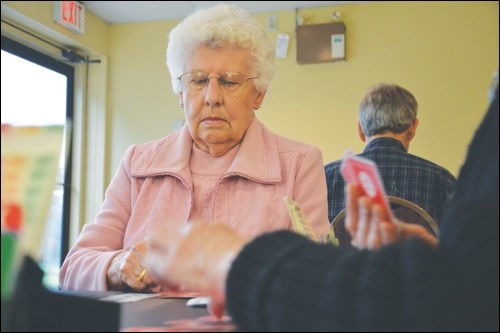Don Lecky thoughtfully shuffles through his cards before shifting his glance to his bridge partner.
“She wears the pants,” the former director of the Squamish Bridge Club says, as he nods toward Lorraine Hurren.
Hurren laughs, but there’s truth in Lecky’s words. In the world of bridge, Hurren is a life master. She’s achieved what many players spend a lifetime pursing: a status in the American Contract Bridge League (ACBL).
“Where are your clubs?” Lecky asks Hurren, before cheekily adding, “That is what you do, you criticize your partner straight away.”
Points and ranking generally have no monetary value in bridge; it’s all about honour. For Squamish club members like Hurren and Lecky, working your way up the point system earns prestige. Hurren has travelled all over North America and south to Mexico to climb the ACBL standings. The grassroots league has more than 160,000 participants and runs hundreds of three, seven and ten-day competitions. That’s where one earns the gold points.
Bridge isn’t just any old pickup game of cards, Lecky says. Sure it’s fun, but while Lecky carefully plots out his move, the room in the Squamish Valley Golf Club is quiet as players concentrate on their games. Bridge keeps one’s mind sharp, Hurren and Lecky agree. Duplicate bridge is social, with four players in two competing pairs. Being able to count cards is also an important skill, Lecky adds.
A few tables over, Peter Larsson’s eyes his hand. Born in Finland, Larsson travelled to India as a young boy with his father who worked as a missionary. Cards weren’t common in his household because of their link to gambling. Larsson picked up bridge as an adult. Five years ago, he became serious about the game after taking lessons from former club directors Lesley and Erwin Tenta. Now Larsson is a regular.
While Larsson’s late introduction to the game is common, it’s a fact that should be changed, Caroline Solonenko says. At 53, Solonenko stands out as one of the younger players in the room. She was taught the game by a boyfriend at the age of 25.
Bridge has the fundamental elements that develop good life skills, Solonenko says. You have to learn to work as a team, practise bidding and read people. Solonenko would like to see the game taught at schools.
“It is competitive. It is probably played equally by men and women,” she says. “I am always afraid that sport is going to go extinct.”
Current club director Colin Ransom is working hard to ensure that doesn’t happen. The Squamish Bridge Club is fortunate enough to have qualified bridge coaches who can aid those new to the game, he said. Every Tuesday, the members hold classes. On game days – Monday and Friday – the club usually sees enough players to fill up to eight tables. Ransom aims to have 11 tables.
“We started out with three or four tables,” Ransom said. “We have a lot of relatively new players.”
On Nov. 10, the club is holding its Erwin Tenta Annual Club Championship in honour of the former club director who died last year. Everyone is welcome, Ransom said.
Bridge provides never-ending stimulation hand-after-hand, he said. Ransom and his wife, Doreen, are multi-level masters. They’ve played in dozens of tournaments across North America. Bridge has become more than a game for the couple, he admits. Vacations are planned around bridge events and friendships are built through the game.
“It brings quality of life to one for life,” he says.
When to play bridge
· Monday game: 6 to 9:40 p.m. (open to all players)
· Friday game: 1 to 4:50 p.m. (open to all players)
· Tuesday coaching: 1 to 3 p.m. (on days posted). Pre-session registration is required.
Games and coaching are $5. For more information visit www.squamishbridgeclub.com.




